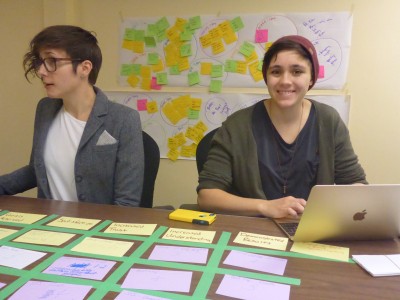by Tessa Nasca, CFICE RA, with Nadine Changfoot, Community Environmental Sustainability hub (Peterborough/Haliburton) Academic Co-lead
The Active Neighbourhoods Canada (ANC) CFICE demonstration project is underway in Peterborough, Ontario. The project, which is a part of a national network of twelve projects that use participatory design towards a goal of creating green, active, and healthy neighbourhoods, has been working with Peterborough’s Stewart Street neighbourhood since June 2014. The project creates opportunities for marginalized residents to engage in planning the public spaces, streets, and sidewalks in their neighbourhood.

Brianna Salmon, Peterborough GreenUp, and Tessa Nasca, CFICE RA, work with the feedback provided at the ANC-CFICE focus group. ©Nadine Changfoot
While the ANC project brings together a diverse group of partners and funders, CFICE’s contribution to the research and evaluation component of the project provides valuable capacity to the project. CFICE-funded graduate student researcher, Tessa Nasca, from the Masters of Sustainability Studies program at Trent University, has been embedded in the project steering committee from the onset of the project. Recently, she has started to conduct evaluative research. Through a series of focus groups with neighbourhood residents and project steering committee members, the research seeks to determine the efficacy of the participatory planning approaches used in the ANC project.
In December 2015, neighbourhood residents were invited to attend a focus group to provide feedback on the project activities. The focus group for the steering committee took place in January 2016. Chevalier and Buckles’ Participatory Action Research Methods were used to guide participants through generating a set of evaluation criteria, in order to help the researcher to understand what effective community engagement looks like from a resident perspective. Using these criteria, residents reflected on the ANC project activities they had participated in, and ranked the activities relative to their evaluation criteria, creating charts as shown in the photos above.
While the data from these focus groups are still being analyzed and the results are not yet ready to share, they provided a rich opportunity for reflection on the ANC project, and on the efficacy of its activities in engaging neighbourhood residents.

